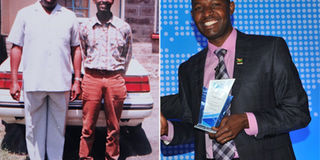DAD STORIES: My father was the symbol of honesty and excellence

Ignatius Waweru and his son Peter Muya in a past photo, and right, Peter Muya in a recent photo. PHOTO | COURTESY
What you need to know:
- He was witty and loved to crack a joke or two as a way of breaking the ice in otherwise frosty engagements.
- My dad placed people first before profits.
- He placed morality over anything else in his transactions.
- #DadStoriesKE. What would you like your dad to know this Father’s Day? Can you say it in 800 words? Email: [email protected]
My father Ignatius Waweru died two years ago, aged 71. In his honour I wrote a book titled, Return on Invested Character. I have summarised the last chapter in that book to reflect on the acronym FATHER – Funny, Authentic, Tenacious, Humanitarian, (pursuer of) Excellence and Righteous.
My dad was funny. He was witty and loved to crack a joke or two as a way of breaking the ice in otherwise frosty engagements. His way of making light of what others thought were heavy matters helped us see life in a new light. This made it possible to have sober engagements without the heaviness and pressure of having to take things “too seriously”.
He was authentic. This term is a rarity in this generation. Most of us want to be authentic but the pressure to conform and hide our true selves just to fit in, is so rampant. Social media seems to have made matters worse. Projecting someone who we aren’t seems a good sell. It is ironic that to sustain a synthetic lifestyle is so difficult than an authentic one yet it is an easier choice when most of us are faced with this tough decision. My dad was simply himself. He didn’t pretend to be someone else.
Our living quarters back in the days were pathetic and dad was doing something about it. However, he didn’t project himself any different and didn’t hold back when some of his distinguished guests came to visit. He accommodated them where he lived with a big smile on his face. My dad was simply a 'What You See Is What You Get' type of a billboard. Because of that, creditors and banks trusted him. He got credit facilities without much hustle. He found favour with God and men for his authenticity.
My dad was tenacious. My dad taught me that entrepreneurship is not fuzzy or funky. It is not about making a million in your 20s or being a billionaire before your 40s. Remaining focused on building a sustainable enterprise is what punctuated his success. Throughout his journey of business between the early 70s and mid-80s, he remained an obscure hustler until the late 80s – almost 15 years later – when he made a big break.
The big break didn’t break his persistence. Even in his old age, he was still running an enterprise. This wasn’t really to make money but just to remain connected and engaged to people. He thrived in the marketplace whether in large-scale or small-scale.
My dad was a humanitarian. He had a big heart. Ricardo Semler says this of morality in profitability:
“Profits must be judged as moral or immoral by how they are earned and how they are disposed. Without a new barometer, we are left with the old barometer—profit for its own sake, regardless of whether it is sustainable or ultimately ruinous.”
My dad had that new barometer. It wasn’t just about giving back to society as compensation for the cost of plunder in the run up to profitability; instead it was sharing as he grew. My dad put people first, before profits. He was motivated by a desire to build an enterprise that delivers social and economic transformation. He believed that transformed people would live better and spend better.
My dad was a pursuer of excellence. He had a touch of class in his work. He loathed mediocrity and expressed his frustration when work wasn’t done to his liking. I recall whenever truckloads of supplies would deliver say bundles of maize flour, he personally inspected how the loaders arranged the bundles in the store. He would go round to confirm that the bundles were arranged on a FIFO (first in, first out) basis. This was to ensure that older stock was easily accessible before the newer stock to cover the risk of older stock going bad. Where he felt the stores were poorly arranged, he would mobilise the staff to redo the work.
If my father were asked what his greatest success on earth was, I bet he would respond like Mordecai Ardon, a painter, said when asked about the most beautiful picture he painted:
Ardon replied, ‘The picture I will paint tomorrow.’
My dad was righteous. He placed morality over anything else in his transactions. He was a trusted trader. If say the price of 24kg maize flour was Sh200 and his profit was Sh20, he wouldn’t sell it at Sh250 to make Sh70. He was open and honest with his clients. He chose to make the slightest of margins in exchange for bulk orders. He wasn’t in the business of controlling his margins by hiding the truth from his customers. He could have done so those days because customers had limited access to information and couldn’t determine the truth. He chose to educate them anyway.
Peter Muya, a founder and Managing Partner of an IT Consultancy firm and a father of three, living in Nairobi.
***
What would you like your dad to know this Father’s Day? Can you say it in 800 words? Email: [email protected]



